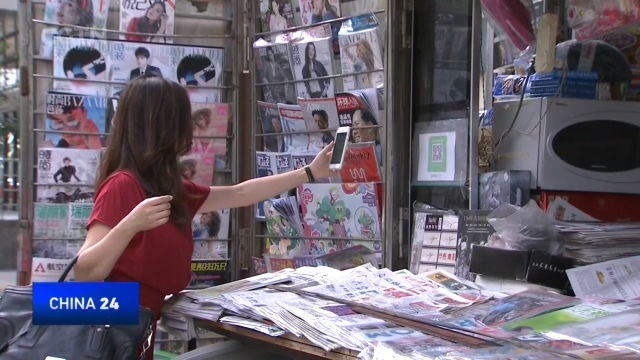
12:57, 20-Aug-2017
Alipay or WeChat: Cashlessness is a new Chinese characteristic

Alipay or WeChat? This is the question posed most often when a purchase is made in China. Cards and cash, the once-dominant purchasing methods, have become a secondary option in less than half a decade. As the mobile payment trend gathers momentum, the days of coins and banknotes are becoming a mere memory for more and more people, Gary Anglebrandt has more.
Cashlessness is a new Chinese characteristic. New payment systems have won over both Chinese consumers and businesses with their convenience and flexibility, squeezing the market share of card and cash payments.
ONSUMER WeChat and Alipay have brought much convenience to my life. I can even go out without my wallet. It saves me time. Compared with taking money, it is safer and not easy to be stolen.
BUSINESSWOMAN If they pay with cash, I have to prepare a lot of change every day. Now, they prefer to pay with WeChat and Alipay, which can reduce my workload.
Cash payments are not always welcome now either, especially with Alipay and Wechat Pay. The two major third-party mobile payment tools in China are launching "no cash days", with the aim of boosting the popularity of electronic payments. Some of the shops participating in the activities have reportedly refused to accept cash payments from their customers.
CONSUMER For the old, they may feel a little insecure with this new technology. Furthermore, it's the consumers' right to choose which way to pay for goods. No companies or businessmen have the right to force them to pay through WeChat of Alipay. If some shops do not receive cash, I may choose another one.
Both internet giants started to expand their services overseas last year. Alipay can be used now in hundreds of thousands of shops in over 70 countries, while WeChat has landed in 19 countries and regions, including Japan, Thailand and South Korea - popular destinations among Chinese tourists. Gary Anglebrandt, CGTN.

SITEMAP
Copyright © 2018 CGTN. Beijing ICP prepared NO.16065310-3
Copyright © 2018 CGTN. Beijing ICP prepared NO.16065310-3